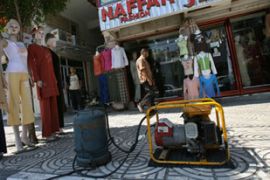Power cuts in Gaza as EU halts aid
Hamas accused of diverting revenues from electricity production.

The power shortages began late on Friday, when the power station closed three of its four generators because diesel supplies had dwindled after Israel shut the Nahal Oz border crossing preventing deliveries.
Israel reopened the crossing on Sunday, but Dor Alon, the private Israeli energy company that deliveries the fuel, was told by the EU that it could not guarantee they would receive payment if they supplied the plant.
‘Revenues diverted’
On Monday, the European Commission in Jerusalem release a statement saying it had: “received information indicating that steps were being taken by Hamas to divert part of the revenues deriving from the production of electricity in Gaza.”
“We are extremely concerned about this and are carefully verifying the situation,” it said.
| “We are ready to resume our support to the Gaza power plant within hours once we receive the appropriate assurances that all the funds will be exclusively used for the benefit of the Gaza population” European Commission statement |
The body is the largest donor to the Palestinians, providing more than $539m so far in 2007, but it blacklists Hamas as a “terrorist group”.
Hamas officials in the Gaza Strip and members of the government set-up by Mahmoud Abbas, the president, after he dismissed the Hamas-led unity cabinet, have blamed each other for the problem.“We warned for weeks that Gaza would fall into darkness if Hamas does not stop occupying the electricity company and does not stop holding on to millions of shekels that they collected from the people of Gaza,” Riyad al-Malki, information minister in the Ramallah-based government, said.
In Gaza, Hamas’s parliamentary bloc said that Abbas’s government headed by prime minister Salam Fayyad, which it refuses to recognise, was to blame.
‘Criminal cut’
“This would not allow us to continue paying for fuel helping to produce the electricity,” said Antonia Mochan, an EU spokeswoman.
Riyad al-Malki, the Palestinian information minister said electricity from the power plant was already a source of revenue for Hamas, but did not explain how.
A senior official in the Hamas administration in Gaza said the concerns were unfounded.
